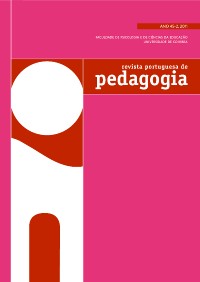Please use this identifier to cite or link to this item:
https://hdl.handle.net/10316.2/5551| Title: | Emílio: texto e contexto | Authors: | Paiva, Wilson Alves de | Keywords: | Rousseau;Émile;Philosophy of education;Pedagogy;Rousseau;Émile;Philosophie de l’éducation;Pédagogie;Rousseau;Emílio;Filosofia da educação;Pedagogia | Issue Date: | 2011 | Publisher: | Imprensa da Universidade de Coimbra | Abstract: | O presente artigo tem o objetivo de discutir a formação do homem no texto
e no contexto da obra Emílio ou da Educação, de Jean-Jacques Rousseau.
A singularidade do discurso e o que se postula nessa obra ampliam consideravelmente
nossa compreensão a respeito das idéias que direcionaram a
formação do homem moderno até os dias de hoje. O que faz de Rousseau um
marco divisório na história da educação ocidental. Seu tratado educacional
produz uma nova visão de homem e, portanto, um rico material teórico para
pensarmos a sociedade do século XXI. O Emílio aparece como uma tentativa
audaciosa e apaixonada de restaurar o homem natural para viver virtuosamente
a realidade social. Em todos os sentidos, o jovem Emílio está sendo
preparado para viver plenamente sua vida pessoal, como homem, ou uma
vida pública, como um dedicado cidadão de alguma comunidade qualquer. Cet article vise une réflexion sur la formation de l’homme dans le texte et le contexte de l’Emile de Jean-Jacques Rousseau. L’unicité de la parole et ce qui est postulé dans ce travail considérablement élargi notre compréhension des idées qui ont guidé la formation de l’homme moderne jusqu’à aujourd’hui. Ce qui rend Rousseau un jalon dans l’histoire de l’éducation occidentale. Son traité d’éducation produit une nouvelle vision de l’homme et donc un materiel théorique très riche pour penser la société du XXI siècle. Emile apparaît comme une tentative audacieuse et passionnée de restaurer l’homme naturel de vivre la réalité sociale vertueuse. Dans tous les sens, le jeune Emile est totalement prêt à vivre sa vie personnelle, comme un homme ou comme un citoyen d’une communauté quel que soit. This article aims to discuss the formation of man in the text and in the context of the book Emile, or on Education, of Jean-Jacques Rousseau. The uniqueness of its content and what is postulated in this work significantly expanded our understanding of the ideas that guided the formation of the modern man until today. What makes Rousseau a ‘landmark’ in the history of education field. His educational treatise produces a new vision of man and therefore a rich theoretical material to think the society of XXI century. Emile appears to be bold and passionate attempt to restore the natural man to live virtuously social reality. In every sense, the young Emilie is fully prepared to live his personal life, as a man, or a public life, as a dedicated citizen of any community whatsoever. |
URI: | https://hdl.handle.net/10316.2/5551 | ISSN: | 1647-8614 | DOI: | 10.14195/1647-8614_45-2_1 |
| Appears in Collections: | Revista Portuguesa de Pedagogia |
Files in This Item:
| File | Description | Size | Format | |
|---|---|---|---|---|
| 01_em_lio-texto_e_contexto.pdf | 259.33 kB | Adobe PDF |  |
Items in DSpace are protected by copyright, with all rights reserved, unless otherwise indicated.
